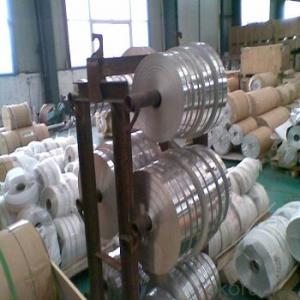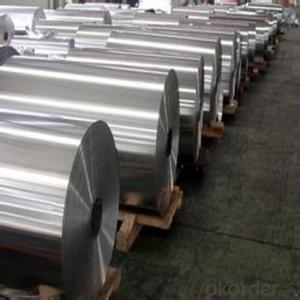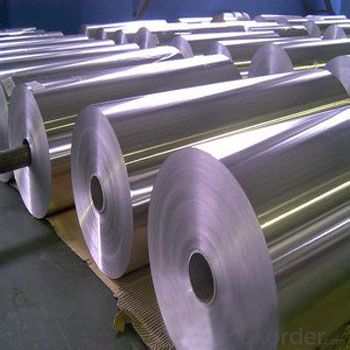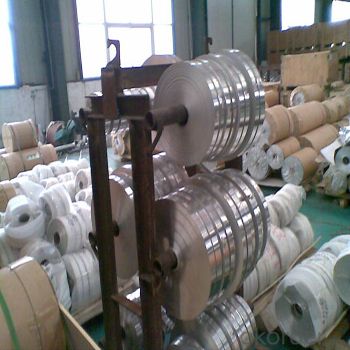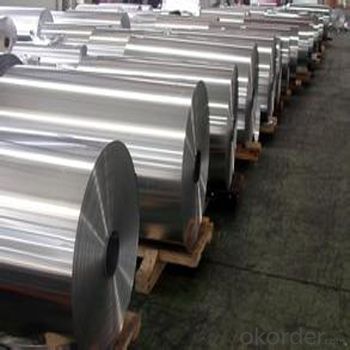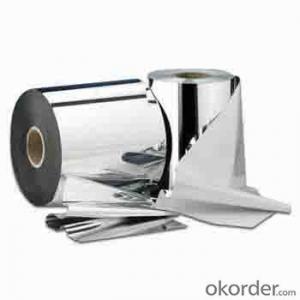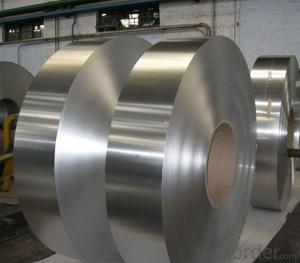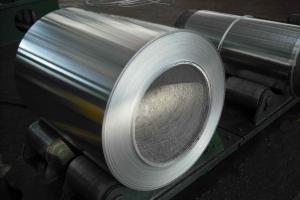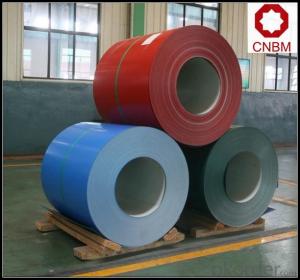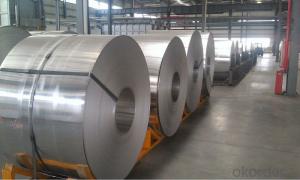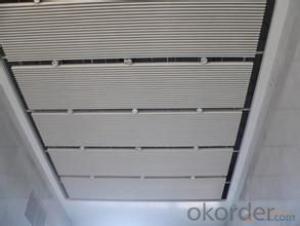1100 Aluminum Coil - Aluminum Continuous Coil (Alu CC Coil)
- Loading Port:
- Qingdao
- Payment Terms:
- TT OR LC
- Min Order Qty:
- 100 m.t.
- Supply Capability:
- 10000 m.t./month
OKorder Service Pledge
OKorder Financial Service
You Might Also Like
1.Why we use aluminum?
In Europe aluminium experiences high rates of recycling, ranging from 42% of beverage cans, 85% of
construction materials and 95% of transport vehicles.Recycled aluminium is known as secondary aluminium, but maintains the same physical properties as primary aluminium. Secondary aluminium is produced in a wide range of formats and is employed in 80% of alloy injections. Another important use is for extrusion.
White dross from primary aluminium production and from secondary recycling operations still contains useful quantities of aluminium that can be extracted industrially.The process produces aluminium billets, together with a highly complex waste material. This waste is difficult to manage. It reacts with water, releasing a mixture of gases (including, among others, hydrogen, acetylene, and ammonia), which spontaneously ignites on contact with air;contact with damp air results in the release of copious quantities of ammonia
gas. Despite these difficulties, the waste has found use as a filler in asphalt and concrete.
2.Specification and Application
ALUMINIUM COIL
ALLOY: AA1***
AA3***
AA5***
AA8***
TEMPER: H14 H16 H18 H22 H24 H26 H32 O/F
THICKNESS:0.03MM-10MM
WIDTH: 30MM-1700MM
COATING: PE(POLYESTER),PVDF,EPOXY or Mill Finished.
STANDARD: GB/T 17748-1999
3.Why you choose us?
Our company promise the best quality, best service and best price.Welcome you to visit our factory!
4.Pictures
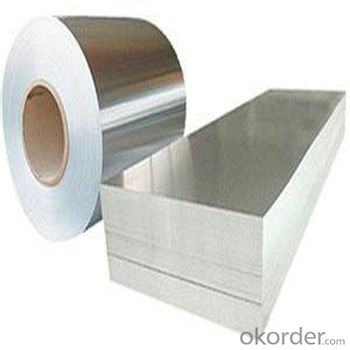
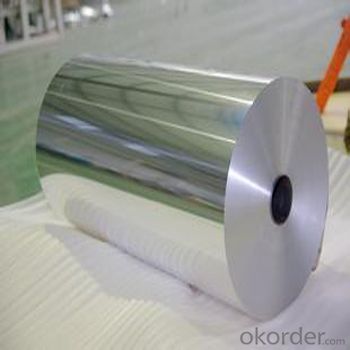
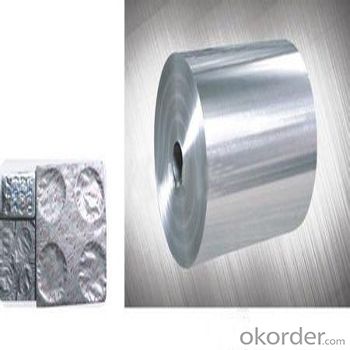
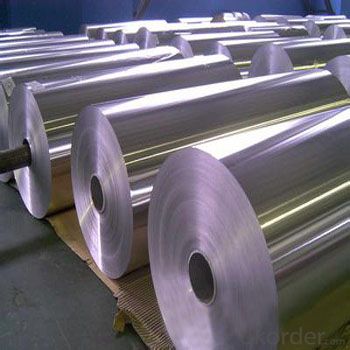
5.FAQ:
1)what is aluminum?
Aluminium (or aluminum; see spelling differences) is a chemical element in the boron group with symbol Al and atomic number 13. It is a silvery white, soft, nonmagnetic, ductile metal. Aluminium is the third most abundant element (after oxygen and silicon), and the most abundant metal in the Earth's crust. It makes up about 8% by weight of the Earth's solid surface.
Aluminium metal is so chemically reactive that native specimens are rare and limited to extreme reducing environments. Instead, it is found combined in over 270 different minerals.The chief ore of aluminium is bauxite.
2)What's kind of payment term we can supply?
CIF,CFR, FOB and other.
3)Can we supply samples?
Yes, we can!
4)What can you do if you have other quastions?
You can contact us freely at any time!
2)How about our payment term?
LC and TT and other.
3)Which country can we supply?
All around the world!
- Q: How do aluminum coils contribute to energy-efficient windows and doors?
- Aluminum coils play a significant role in making windows and doors energy-efficient. Firstly, aluminum is a highly conductive material, meaning it can efficiently transfer heat and cold. This property allows aluminum coils to act as a thermal barrier, preventing the transfer of heat from the outside to the inside and vice versa. By minimizing heat transfer, aluminum coils help to reduce the amount of energy needed to cool or heat a building, resulting in lower energy consumption and reduced utility bills. Additionally, aluminum coils are often used in the construction of window and door frames due to their lightweight and durable nature. This lightweight property makes it easier to install and operate windows and doors, while their durability ensures long-lasting performance. The use of aluminum coils also allows for the creation of sleek and narrow frame designs, maximizing the glass area and allowing more natural light to enter the building. This reduces the need for artificial lighting during the day, further contributing to energy savings. Moreover, aluminum is a highly recyclable material, and the use of aluminum coils promotes sustainability. By using recycled aluminum to manufacture these coils, energy-efficient windows and doors can be created with a lower carbon footprint. This reduces the environmental impact of the building industry and contributes to a more sustainable future. In conclusion, aluminum coils contribute to energy-efficient windows and doors through their thermal barrier properties, lightweight and durable nature, and recyclability. By minimizing heat transfer, facilitating efficient installation, and reducing the use of artificial lighting, aluminum coils play a key role in creating sustainable and energy-saving building solutions.
- Q: What is the creep resistance of aluminum coils?
- The creep resistance of aluminum coils is generally high, as aluminum has a low melting point and exhibits minimal creep deformation under normal operating conditions.
- Q: What are the different coil diameters available for aluminum coils?
- The coil diameters for aluminum coils can differ based on specific needs and applications. Typically, aluminum coils are offered in various diameters to accommodate different requirements. These diameters can vary from a few inches to several feet. Manufacturers and suppliers may have different options for coil diameters. It is crucial to consider that the chosen diameter will affect factors like coil weight, handling, and compatibility with machinery or equipment. Therefore, it is recommended to consult with suppliers or manufacturers to determine the available coil diameter options for aluminum coils based on intended use and requirements.
- Q: Are aluminum coils resistant to fire?
- Yes, aluminum coils are generally resistant to fire due to their high melting point and low flammability.
- Q: What is the thickness range of aluminum coils?
- The thickness of aluminum coils can differ depending on the particular application and industry. Generally, aluminum coils range from 0.006 to 0.25 inches (0.15 to 6.35 mm) in thickness. This wide range enables diverse uses, ranging from delicate and lightweight applications like packaging materials or electrical components to thicker coils utilized in construction or automotive sectors. It should be emphasized that these are broad ranges, and the desired thickness may vary depending on the specific use and customer requirements.
- Q: remember maybe a decade ago or so, copper used to be cheaper than aluminum. now it is the other way around, copper is more expensive. Even copper pennies cost more so I heard they are mixed with another metal to make a penny. What caused the change in value and when did it really start happening?In fact, copper has become valuble enough to steal. Some factories which have copper, have had their metals stolen, but outsiders who break into the factories to specifically take the copper. Then the factories started hiring security to prevent intruders from taking the copper.
- aluminum is probably being replaced with plastic and composite materials in such things as airplane bodies and equipment housing. copper's main use is in wiring, and there is no replacement for it (yet)
- Q: Describe the various uses of aluminum coils in the manufacturing industry.
- <p>Aluminum coils are widely used in manufacturing due to their lightweight, corrosion resistance, and strength. They are utilized in the production of various products such as automotive parts, aerospace components, and construction materials. Aluminum coils are also employed in the manufacturing of electrical wiring, heat exchangers, and packaging materials. Additionally, they are used in the production of cans and foils for food and beverage industries. Their versatility makes aluminum coils an essential material in many manufacturing processes.</p>
- Q: How do aluminum coils contribute to energy-efficient insulation?
- The role of aluminum coils in enhancing energy-efficient insulation cannot be overstated. To begin with, aluminum is an exceptional heat conductor, allowing it to effectively transfer heat away from its source and minimize heat penetration into insulated spaces. This quality ensures a stable and comfortable indoor environment, thereby reducing the need for excessive heating or cooling. Moreover, aluminum coils find extensive application in air conditioning and refrigeration systems, where they serve as the primary heat transfer medium. By efficiently absorbing and dissipating heat, these coils expedite the cooling process, resulting in reduced energy consumption and improved overall energy efficiency. Furthermore, the lightweight nature of aluminum makes it highly convenient for handling and installation in insulation systems. Its low weight provides flexibility and ease during manufacturing and transportation, leading to cost and energy savings. In addition, aluminum coils possess remarkable corrosion resistance, guaranteeing their durability and preventing the deterioration of insulation performance over time. This longevity ensures long-term energy efficiency as the insulation system remains effective without the need for frequent maintenance or replacement. In conclusion, aluminum coils significantly contribute to energy-efficient insulation through their effective heat conduction, facilitation of rapid cooling in air conditioning systems, reduced energy consumption, lightweight and easy handling, as well as long-lasting performance due to corrosion resistance. These qualities make aluminum coils the ideal choice for enhancing energy efficiency in insulation applications.
- Q: Some properties of aluminum are summarized in the following list.normal melting point 658°C heat of fusion 3.95 kJ/g normal boiling point 2467°C heat of vaporization 10.52 kJ/g specific heat of the solid 0.902 J/g°C Calculate the quantity of energy required to heat 1.58 mol of aluminum from 33°C to its normal melting point? In KJCalculate the quantity of energy required to melt 1.02 mol of aluminum at 658°C? In KJCalculate the amount of energy required to vaporize 1.02 mol of aluminum at 2467°C? In KJ
- Calculate the quantity of energy required to heat 1.58 mol of aluminum from 33°C to its normal melting point in KJ- 1.58 mol x 26.98 g/mol x 0.902 J/g°C x (658 - 33)°C x 1 kJ/1000 J = 24.03 kJ Calculate the quantity of energy required to melt 1.02 mol of aluminum at 658°C In KJ- 1.02 mol x 26.98 g/mol x 3.95 kJ/g = 108.7 kJ Calculate the amount of energy required to vaporize 1.02 mol of aluminum at 2467°C In KJ- 1.02 mol x 26.98 g/mol x 10.52 kJ/g = 289.5 kJ
- Q: Can recycled aluminum coils be reused to create new ones, or are they only suitable for disposal?
- <p>Old aluminum coils can indeed be recycled and used to make new ones. Recycling aluminum is an efficient process that conserves resources and reduces energy consumption compared to mining and refining new aluminum. The recycling process involves melting the old coils, which can then be reshaped into new coils without losing any of their properties. This makes recycling aluminum coils a sustainable and environmentally friendly alternative to disposal.</p>
Send your message to us
1100 Aluminum Coil - Aluminum Continuous Coil (Alu CC Coil)
- Loading Port:
- Qingdao
- Payment Terms:
- TT OR LC
- Min Order Qty:
- 100 m.t.
- Supply Capability:
- 10000 m.t./month
OKorder Service Pledge
OKorder Financial Service
Similar products
Hot products
Hot Searches
Related keywords

